By: Hiro Katoh March 6, 2019
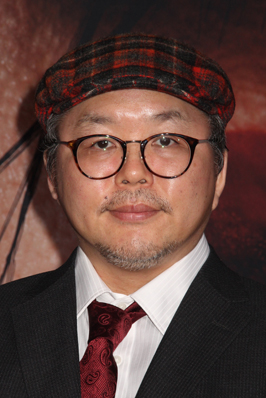
With the rising popularity of the Japanese manga culture, several films based on the Japanese comic have been released in theaters. Unfortunately, as a Japanese boy who loves manga, I hadn’t been able to find any that I really liked or impressed me. That is until Alita: Battle Angel!
This film is a perfect balance between Japanese modern manga, which is complicated, kind of ugly, rooted in a dark society with a raw human relationship, and an American movie production- powerful, bright, and energetic. In our exclusive interview with Japanese Manga author, Yukito Kishiro we tour the experience of Alita: Battle Angel
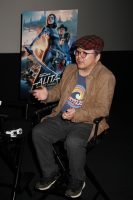 Q: I know that you joined James Cameron (writer and producer) on this journey to make this story into a film almost 20 years ago. Could you tell me more about when he first approached you and what your reaction was when you first met him?
Q: I know that you joined James Cameron (writer and producer) on this journey to make this story into a film almost 20 years ago. Could you tell me more about when he first approached you and what your reaction was when you first met him?
It was a rather standard beginning, actually. At first I was unofficially contacted by FOX saying that they had an offer to make my manga into a movie. For me, this was a big deal. I was honored, and very excited. Then I was told that “Furthermore, it’s Cameron who wants to make it into a movie.” However, around 1995 another offer to make it into a movie already came in, and it turned into a competition between the two offers. Then, I got some jolting information from the other party that Cameron’s TV show, Dark Angel, was a rip-off of my manga, Alita: Battle Angel (Gunnm).
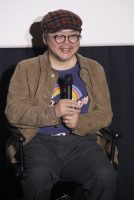 Hearing that, I had someone contact Cameron to ask, “Is this true?” and I received a fax typed by Cameron himself, signed in his own hand, saying, “That is absolutely not the case. I deeply respect your work.” I saw that and thought, “Oh, if that’s how it is then I can trust him then we entered negotiations,” and that’s exactly what happened. But the negotiations for this were also incredibly tough. I think it took about 2 years. Everything finally came together around the end of 2000, but it wasn’t until after, in May of 2003, that Cameron came to Japan. The official reason for his visit was to inspect the 3D cameras, but we met in Shinjuku and really talked things out, and that was when he told me himself how deeply he respected my work. Something that really surprised me during that conversation was finding out that one of the many
Hearing that, I had someone contact Cameron to ask, “Is this true?” and I received a fax typed by Cameron himself, signed in his own hand, saying, “That is absolutely not the case. I deeply respect your work.” I saw that and thought, “Oh, if that’s how it is then I can trust him then we entered negotiations,” and that’s exactly what happened. But the negotiations for this were also incredibly tough. I think it took about 2 years. Everything finally came together around the end of 2000, but it wasn’t until after, in May of 2003, that Cameron came to Japan. The official reason for his visit was to inspect the 3D cameras, but we met in Shinjuku and really talked things out, and that was when he told me himself how deeply he respected my work. Something that really surprised me during that conversation was finding out that one of the many
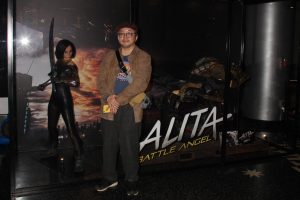 memos he had written during his time as a student was an idea for “a city at the base of an elevator suspended from the sky.” I asked him, “Do you think we can call this synchronicity?” and he said, “Yeah, I think we can.” And I was just thinking “Woah” and we shook hands and I got so excited. Only, after he returned home, he had another project he was working on besides Alita: Battle Angel, and told me he would decide by the end of the year which one he would make first. That other project was Avatar. Avatar, of
memos he had written during his time as a student was an idea for “a city at the base of an elevator suspended from the sky.” I asked him, “Do you think we can call this synchronicity?” and he said, “Yeah, I think we can.” And I was just thinking “Woah” and we shook hands and I got so excited. Only, after he returned home, he had another project he was working on besides Alita: Battle Angel, and told me he would decide by the end of the year which one he would make first. That other project was Avatar. Avatar, of
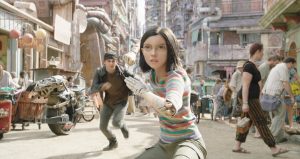 course, was the movie he ended up making, and it was a really stunning, huge success. But after it came out I didn’t hear anything from him about making Alita: Battle Angel. I kept waiting, wondering the whole time, “What’s going on? Does he not want to make this movie anymore?” Then, in 2016, Jon Landau (producer) came to Japan saying, “We’re going to start production of this movie,” and shared a bunch of documents and materials with me. When I received a copy of the screenplay translated into Japanese, and I read it I thought it was really great and thought, “This is something I can trust.”
course, was the movie he ended up making, and it was a really stunning, huge success. But after it came out I didn’t hear anything from him about making Alita: Battle Angel. I kept waiting, wondering the whole time, “What’s going on? Does he not want to make this movie anymore?” Then, in 2016, Jon Landau (producer) came to Japan saying, “We’re going to start production of this movie,” and shared a bunch of documents and materials with me. When I received a copy of the screenplay translated into Japanese, and I read it I thought it was really great and thought, “This is something I can trust.”
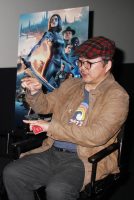 Q: There have been many cases where Hollywood has tried to adapt Japanese manga to film and failed, but in this case you, the original work’s author, are also satisfied. Additionally, this is a film that American audiences, especially women, seem to enjoy. When your work was chosen to be made into a Hollywood movie, did you trust Cameron and director Robert Rodriguez, and sort of leave it to them? Or was there a lot of back and forth between you and them before you gave them the green light?
Q: There have been many cases where Hollywood has tried to adapt Japanese manga to film and failed, but in this case you, the original work’s author, are also satisfied. Additionally, this is a film that American audiences, especially women, seem to enjoy. When your work was chosen to be made into a Hollywood movie, did you trust Cameron and director Robert Rodriguez, and sort of leave it to them? Or was there a lot of back and forth between you and them before you gave them the green light?
I left it to them. I didn’t make requests or anything like that. Just in 2003, when I met Cameron, I told him, “Please surprise me. It’s ok if you change things. As long as it’s interesting I’ll allow it, so for now, just try to surprise me.” And the work we have now is truly fantastic. There weren’t any requests from me at any point during the process. Because the screenplay was so good, I felt that I was able to trust them 100 percent. Throughout production, Landau would tell me, “We’ve finished this scene,” and send me bits of the footage so I could see it myself.
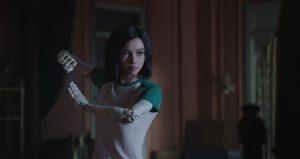 Q: What surprised you the most about the film?
Q: What surprised you the most about the film?
At first, I was most surprised by the main character, Alita herself. In 2003, when I first met Cameron, he told me “I’m going to make Alita fully CG. The movie is also going to be 3D,” but that was a time when Avatar still hadn’t been released, and I thought, “There’s no way you can screen a 3D movie at the movie theater.” Not to mention something like full CG, I had thought it would be totally impossible, so I was surprised to see it executed so well.
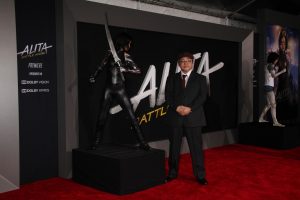 Q: Lastly, is there anything you would like to say to the young people of today? Now there are many people, not only in Japan, but worldwide, who would like to become manga artists. There are also Americans who want to become manga artists in Japan. What message would you like to convey to them?
Q: Lastly, is there anything you would like to say to the young people of today? Now there are many people, not only in Japan, but worldwide, who would like to become manga artists. There are also Americans who want to become manga artists in Japan. What message would you like to convey to them?
YK: The first thing I would say is, “Don’t give up.” There are lots of fads and crazes in this world, but don’t let them sway you, and if there is something you want to create, do it. There will definitely, always be people who say things like, “That isn’t interesting,” or “No one will go for that,” but it is always best not to listen to them. For me, I thought “I’ll write and draw Science Fiction!” but there weren’t many opportunities, and I struggled a lot. But, in the end I’m really glad I stuck with Science Fiction. If I hadn’t, Alita: Battle Angel would never have come to be.
Here are an original interivew in Japanese.
Q: ジェームズ・キャメロン(脚本・製作)と20年近くこの作品の映画化への旅を一緒にしてきたわけですが、最初にアプローチされた時のこと、そして、それに対するリアクション、キャメロンに初めて会ったときのことなどを教えてください。
YK: 最初は結構地味な感じで始まりました。まず非公式にフォックスから「映画化のオファーが来ている」って言われました。「それは大変だ」ってことになって、「しかもキャメロンが映画化したがっている」って知らされたんです。ただ、1995年くらいから映画化のオファーは来ていまして、その方との競合になってしまったんです。その方が「キャメロンの製作しているTVドラマ『Dark Angel』は『銃夢』のパクリだ」というような情報を流して揺さぶりをかけてきました。そこで、「それは本当なのか?」ってキャメロンに電通を通じて聞いてもらったところ、そしたらキャメロンが自分でタイプして直筆のサインを入れたファックスが送られてきて、「そういうことは一切ありません、木城先生の内容をリスペクトしています」という内容だったんです。それで「おお、これならばちゃんと信用して映画交渉に入れるだろう」という事になって(キャメロンと)交渉に入りました。この交渉もすごくタフなネゴシエーションだったんですよ。2年くらいかかっちゃったかな。それでやっとまとまったのが2000年の終わりくらいだったんですけど、その後、2003年の5月にキャメロンが単独で日本にやってきました。表向きの理由は確か3Dカメラの視察っていう事だったんですけど、新宿でお会いしてじっくりお話をしまして、そこで非常にリスペクトしてくれていたってことを聞きました。あの時びっくりした話としては、キャメロンが学生の頃にいろいろと書いていたメモの中に「軌道エレベーターにつる下がった都市」っていうアイデアがあったらしいんです。それまで誰にも話してないアイデアだったそうで、「これはシンクロしていたってことにしていいですか」って聞いたら、「おお、シンクロにしていいよ」って言われて、「うああっ」て握手して盛り上がりました。ただキャメロンが帰ってから、(キャメロンには)『Alita: Battle Angel』のほかにもう一つ企画があって、年末までにどっちを映画化するかを決めるって言われました。そのもう一つというのが『Avatar』でした。『Avatar』が映画化されて、見事大成功されたのは素晴らしいんですが、その後、『Alita: Battle Angel』の映画化の話が来なくなって、「どうなってるのかな。もう映画化しないんだろうか?」と思いながらずっと待たされました。そして、2016年にジョン・ランド(プロデューサー)が来日して、「映画化の制作を始めるから」と言っていろんな資料を見せてくれました。その時に日本語訳したシナリオも貰ってそれを読んだらすごく面白かったので、これは信頼できるものだろうと思いました。
Q: 日本の漫画を原作とした映画化をハリウッドがすると失敗が多いように思われますが、今回は原作者も満足している。そして、アメリカ人の観客、特に女性が気に入っているという作品です。ハリウッドでの映画化にあたり、キャメロンと監督のロバート・ロドリゲスを信用してお任せという感じだったのでしょうか? それとも頻繁に先方とやり取りをしてOKを出していったのでしょうか?
YK: お任せでした。僕の方から注文などはしなかったです。ただ2003年にキャメロンに会ったときに「驚かしてください。変えちゃってもいいです。面白ければ許されるからとにかく僕を驚かせてください」と言ったんです。それで事実素晴らしい作品ができた。途中で、こちらから注文をつけることはなかったです。シナリオがものすごくよかったので100パーセント信頼できると思っていました。ランドが、「このシーンができたよ」と言って、映像を少しずつ送ってきて見せてくれました。
Q: どこが一番驚きましたか?
YK: 最初は何より、主人公のアリタに驚きました。2003年に、初めてキャメロンに会ったとき、「アリタはフルCGで作る。映画もまた3Dで作る」と言っていたんですが、当時は『Avatar』もまだ公開されていない時代でしたから「立体映画なんて映画館で上映できるわけないだろう」って思ったんです。ましてやフルCGなんて、そんなの無理だろうと思っていたんですけど、見事にできてきたのでびっくりしました。
Q: 最後に若者へのメッセージをいただけますか? 今は日本人だけでなく全世界的に漫画家になりたい人は多くなってきました。日本の漫画家になりたいというアメリカ人もいます。若者、漫画家になりたい人へのメッセージをお願いします。
YK: まず「諦めないこと」ですね。流行というものが世の中にはありますけど、その流行に左右されないで自分の書きたいものがあったらその書きたいものを貫くこと。絶対にね、「そんなの面白くないよ」とか「そんなの受けないよ」とかっていう人が必ず出てきますけど、そういう人の話は絶対に聞かないほうが良いです。僕もSFを書こうと思ったんですけどなかなかチャンスがなくてすごく苦労しました。でも、やっぱり最後までSFを貫き通して書いてよかったと思います。それがなかったら『Alita: Battle Angele』は存在しなかったので。
Alita: Battle Angel is currently playing in theatres nationwide. For more info on Yukito Kishiro, Follow him on his official Facebook page at, https://www.facebook.com/yukitokishiro/
Interview by Izumi Hasegawa / Hollywood News Wire Inc. https://twitter.com/HNW_Izumi
Edited by: Jody Taylor – https://twitter.com/RealJodyTaylor & https://www.instagram.com/realjodytaylor/
Follow Us: What’s Up Hollywood at https://twitter.com/WhatsUpHWood Like Us on Facebook: https://www.facebook.com/whatsuphollywood/
Translated in English by Diana Bellafiore
Text by Hiro Katoh
